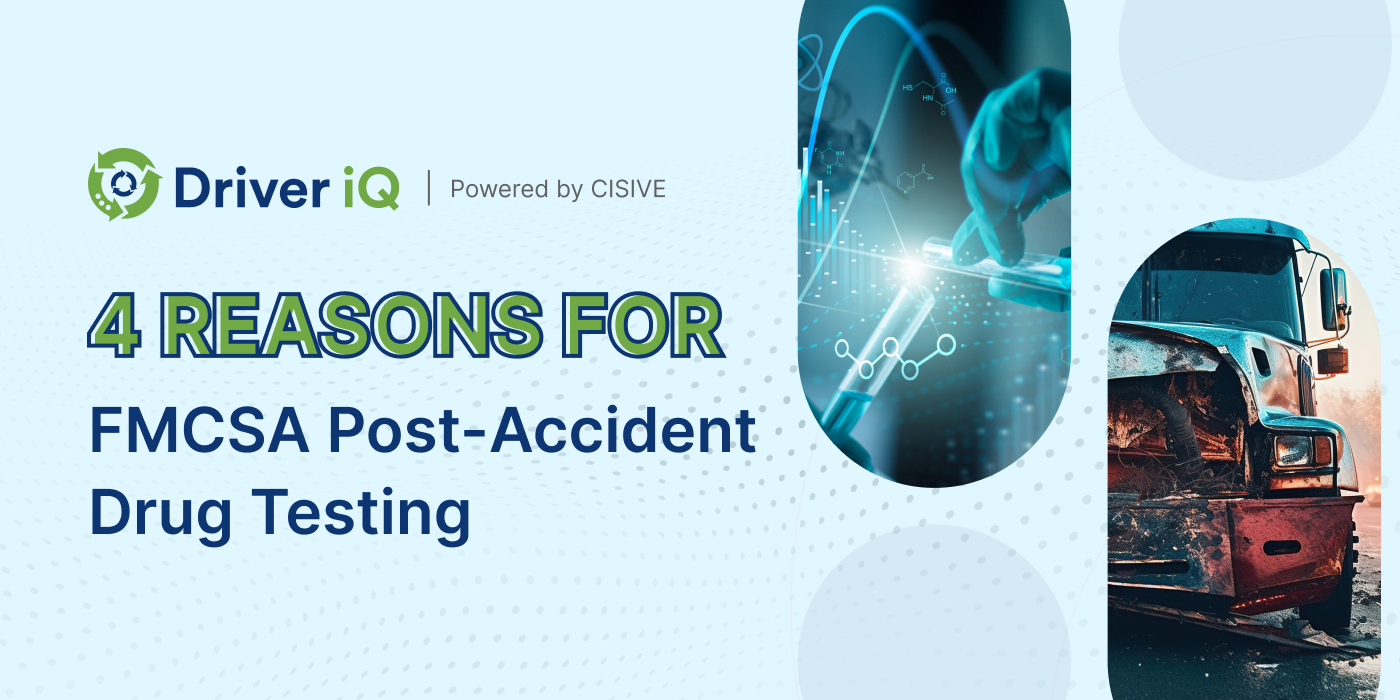
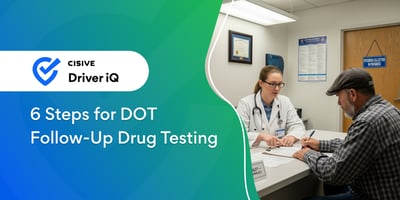
When drivers fail a DOT-mandated drug or alcohol test or refuse to take one, they create...

The Federal Motor Carrier Safety Administration's (FMCSA) post-accident drug testing regulations help increase public safety, decrease employer liability, and minimize drug and alcohol use by CDL drivers. But when is a drug test required after an accident?
There are four scenarios where DOT post-accident testing is required.
A testing and reporting service, such as Driver iQ, can help your company stay compliant with FMCSA regulations.
Federal-regulated post-accident DOT drug and alcohol testing has been put into place to minimize drug and alcohol use when drivers are operating a large commercial motor vehicle because they can cause significant damage in an accident.
This regulated mandatory testing is designed to be a deterrent for drug and alcohol abuse by drivers of large vehicles and helps reduce employer liability in the event of an accident.
Federal Motor Carrier Safety Administration's (FMCSA) post-accident drug testing is required in specific accident scenarios to determine if substance use was a contributing factor, and compliance protects your company and your drivers.
Key TakeawaysHere are the key things to know about FMCSA post-accident drug testing:
|
FMCSA is a part of the Department of Transportation (DOT), and the FMCSA post-accident drug test is required to be administered to commercial driver's license (CDL) drivers by their employers after specific accident situations as outlined by the regulations.
The DOT test requires both drug and alcohol tests.
A DOT drug test is a five-panel urine test that screens for marijuana, opioids, amphetamines, cocaine, and phencyclidine (PCP). A DOT breath alcohol test screens for non-compliant alcohol levels.
A CDL driver usually includes drivers of vehicles that:
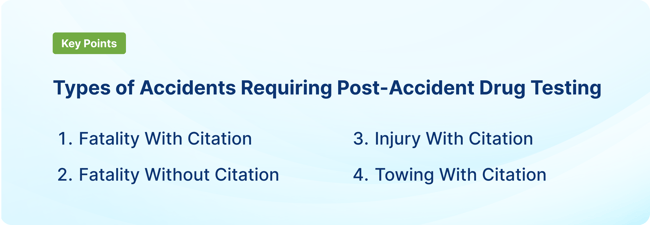
There are only four specific situations where testing would be required after an accident.
In a nutshell, if the CDL driver doesn't receive a citation for a moving violation and there are no fatalities, FMCSA testing isn't required.
One easy-to-remember saying that describes when it's required is "hearse, nurse, or tow." However, the last two depend on whether the driver received a citation.
If the driver receives a citation for a moving violation and any person has died during the accident, the driver is subject to FMCSA testing.
The key here is that someone is declared deceased at the scene; however, it still may be required if the person dies later.
In actuality, any fatality at the scene of an accident, whether or not the driver receives a citation, falls under FMCSA post-accident regulations.
However, if the driver doesn't receive a citation for a moving violation and a person is taken to the hospital and dies at a later time, the FMCSA has provided guidance that the driver is required to be tested if the person dies within 8 hours or 32 hours, with drug/alcohol or drug testing becoming required, respectively.
If the driver receives a citation for a moving violation and any person involved in the accident requires immediate medical attention away from the scene of the accident, the driver is subject to FMCSA testing.
This would include someone who was taken to the hospital after the accident and died at a later time.
However, if someone involved in the accident decides to go to the hospital or seeks medical attention on their own after they've left the scene, the driver is not required to be tested.
Testing is also not mandatory if injuries were only treated at the scene. The injured person needs to be transported away from the scene for medical treatment for testing to be required.
If the driver receives a citation for a moving violation and any vehicle involved in the accident is disabled and requires towing or removal from the scene, the driver is subject to FMCSA testing. Although this usually means towing, it also includes any use of another vehicle to remove a disabled vehicle.
It should be noted here that employers themselves can require testing for any accidents, even if they don't fall under FMCSA regulations. However, to avoid potential lawsuits, testing requirements should be clearly outlined before any accident and applied equally to all drivers.
Employers should not single out one particular driver after an accident for testing unless there is reasonable suspicion they were under the influence of drugs or alcohol. However, testing all drivers after any accident eliminates any potential accusation of discrimination.
Employers are expected to arrange the specimen collection by DOT-certified specimen collectors and specimen delivery to a DOT-approved lab after any FMCSA-qualifying accident.
An alcohol test should be administered within 2 hours of an accident, but employers can continue to attempt to administer the test for up to 8 hours.
The controlled substances test needs to be taken within 32 hours of the accident.
After these time frames, the employer is expected to stop attempting to administer the test.
Many accidents happen when testing facilities are closed or when the driver is too far away from one to get tested within the time frame.
FMCSA guidance specifies that any tests received by the employer that were given by state, federal, or local law enforcement in the course of their accident investigation meet the requirements of the regulations.
During some accidents, investigators detain the CDL driver for questioning, or the driver may need medical attention, either of which can interfere with on-time testing.
Employers are not permitted to prevent a driver from receiving medical care just to make sure the FMCSA test is performed within the required time.
In any situation where testing couldn't be completed within the required timeframe, the employer needs to document the reasons why the testing couldn't be administered and what steps were taken in an attempt to comply.
Although alcohol testing can be completed within 8 hours after an FMCSA-qualifying accident, a report still has to be made if alcohol testing is not done within 2 hours.
Sometimes, the citation isn't given until after the 8-hour or even the 32-hour timeframe. In this case, testing isn't required because the test itself has to be given within those time limits.
However, if the citation is given after the designated window, the reasons why the test wasn't administered within the timeframe still need to be documented.
The documentation needs to be made available for FMCSA for any future audits or in the event a report is requested. FMCSA maintains a DOT clearinghouse of all reported drug and alcohol test violations made by drivers.
Cross-country drivers who tend to drive overnight often have to self-report accidents and citations.
Because of the time-sensitive nature of FMCSA regulations, drivers need to report an accident to their employer immediately when possible.
In the event the driver didn't report a citation that would cause a collision to become a FMCSA-qualifying accident, the employer needs to document this so the employer is absolved of any liability.
Non-compliance with DOT post-accident tests decreases safety and increases liability. There are also penalties for employers and drivers who don't comply with FMCSA post-accident drug and alcohol testing.
The most common penalty is a hefty fine. The fine for employers for non-compliance is thousands of dollars and can be as high as $20,000 or more.
In addition to fines, the employer can be subject to criminal penalties. This can lead to suspension or disqualification of their commercial vehicle operating license.
Drivers who refuse testing must immediately be removed from performing safety-sensitive functions and can also have their CDL license suspended.
Federal Motor Carrier Safety Administration's post-accident drug testing helps keep the public, your cargo, and your drivers safe. It also helps protect your company from liability.
Trying to arrange DOT-certified specimen collection at the last minute locally or across state lines within hours of an accident can become difficult and stressful.
When you partner with Driver iQ, you have access to convenient, flexible, and FMCSA-compliant drug and alcohol testing options.
Find out more about how your company can stay compliant with FMCSA post-accident drug testing regulations with Driver iQ’s drug and alcohol screening service. Speak to an expert today.
Author: Jessica McDonald
Bio: Product Strategy and Development, Drug Testing and Occupational Health Subject Matter Expert at Cisive
Let's Connect on LinkedIn
When drivers fail a DOT-mandated drug or alcohol test or refuse to take one, they create...
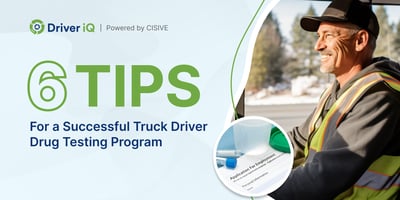
Secure and reliable transportation networks rely on commercial drivers who are fit for duty and...
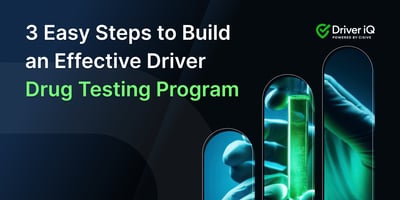
Motor carriers need to hire drivers who are safe and reliable, both for the public’s safety and...